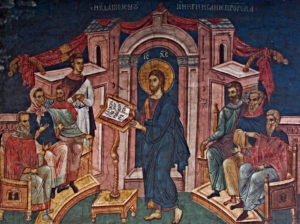Thoughts on Sunday’s Lessons for Jan. 27, 2019
First Reading: Nehemiah 8:1-3, 5-6, 8-10
The idea of Torah – God’s teaching so holy and beloved that it is understood as law – runs like a stream through Sunday’s readings.

Christ preaching in the synagogue. Fourteenth century fresco in the Visoki Decani monastery in Kosovo. (Click image to enlarge.)
We hear it from the prophet Nehemiah reading the Torah to the people returned from exile in the first reading, to Jesus opening the Torah to begin his ministry with Isaiah’s call to justice in the Gospel. In the first reading, it is a holy moment when the prophet Ezra opens the Torah and spends the entire morning reading and interpreting the text to a people who weep with joy at this revelation.
Psalm: Psalm 19
First in this Psalm we sing the glory of God. Then we sing the glory of God’s law, which the Psalmist understands as the Torah, the first five books of the Old Testament that set out God’s covenant with the people. These are the holy scrolls that the scribe Ezra read to the community in the first reading and that Jesus will read in the synagogue in the Gospel. The heavens and the skies themselves pour out the glory of God and of God’s work in the law.
Second Reading: 1 Corinthians 12:12-31a
Today’s reading immediately follows and builds on last Sunday’s declaration that every member has individual gifts and is called to specific services in the church using those gifts. Paul now likens the people of Corinth – and every Christian community – to the body of the risen Christ in the world. All the parts of the body are needed. Every part is important, and all of them have to work together. The eye, the hand, the ear, the leg … none can go it alone. What is true of our bodies is true of church: We’re all joined together in the work of the community. We need each other and we must respect one another.
Gospel: Luke 4:14-21
Jesus’ public ministry has begun. Driven by the Spirit that came down at the time of his baptism and sent him to be tested in the desert, he now returns to the synagogue in his childhood home, Nazareth. Unrolling the Torah scroll to the Prophet Isaiah, he reads verses that will define his mission, ideas that echo his mother’s song and God’s covenant with the people at Sinai. This scripture is fulfilled in him, he declares, claiming as his own the duty to bring good news to the poor and the oppressed, and to declare the year of Jubilee in which slaves are freed and debts are forgiven.
